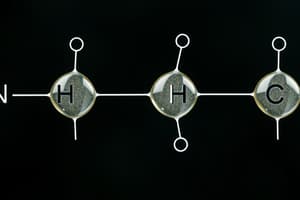Podcast
Questions and Answers
What is a substrate in organic reactions?
What is a substrate in organic reactions?
- A molecule that initiates the reaction
- A short-lived species formed during the reaction
- A substance that stabilizes the product
- A molecule that can be attacked (correct)
What occurs during heterolysis?
What occurs during heterolysis?
- The bond breaks without forming intermediates
- Each atom receives one electron from the bond
- Both electrons remain with the original atom
- One electron goes to each atom (correct)
Why are intermediate species considered unstable?
Why are intermediate species considered unstable?
- They are permanent states in the reaction
- They have a high energy state and can rearrange electronically (correct)
- They lack any electron configurations
- They form strong ionic bonds
In a reaction example CH₄ → CH₃⁺ + H⁺, what is CH₃⁺ classified as?
In a reaction example CH₄ → CH₃⁺ + H⁺, what is CH₃⁺ classified as?
What distinguishes homolysis from heterolysis in bond breaking?
What distinguishes homolysis from heterolysis in bond breaking?
Flashcards
Substrate
Substrate
A molecule that is attacked by a reagent in a chemical reaction.
Reagent
Reagent
A substance that attacks the substrate in a chemical reaction.
Intermediate
Intermediate
A short-lived species formed during a chemical reaction. Often unstable and undergoes rearrangements to gain stability.
Heterolysis
Heterolysis
Signup and view all the flashcards
Homolysis
Homolysis
Signup and view all the flashcards




